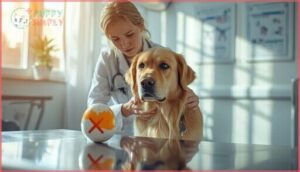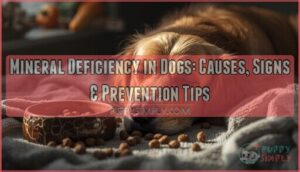This site is supported by our readers. We may earn a commission, at no cost to you, if you purchase through links.
Your dog’s soulful eyes follow your fork as you finish your breakfast omelet, and you wonder if sharing a bite would be a treat or a mistake. Unlike chocolate or grapes, eggs won’t land your pup in the emergency vet clinic, but the answer to whether dogs can eat eggs isn’t quite as simple as yes or no.
The preparation method matters more than you might think—raw eggs carry risks that cooked ones don’t, and even the nutritional benefits depend on how you serve them. Getting this right means understanding the difference between a protein-packed snack and a potential health hazard, because what’s safe for your breakfast plate doesn’t automatically translate to your dog’s bowl.
Table Of Contents
Key Takeaways
- Cooked eggs are safe and nutritious for dogs when prepared plain (no butter, oil, or seasonings), delivering complete protein, essential vitamins, and fatty acids that support muscle health and coat quality.
- Raw eggs carry real risks, including Salmonella contamination (found in roughly 1 in 20,000 eggs) and biotin deficiency from avidin in raw egg whites, making thorough cooking to 74°C the only safe preparation method.
- Portion control matters—small dogs can handle 1/4 to 1/2 egg daily, medium dogs one egg every other day, and large breeds one egg every 2-3 days, keeping eggs within 5% of total caloric intake.
- Skip eggs entirely if your dog has kidney disease, pancreatitis, or shows allergic reactions (affecting about 4% of dogs with food allergies), and always consult your vet before adding them to dogs with pre-existing health conditions.
Can Dogs Eat Eggs Safely?
If you’ve ever wondered whether it’s safe to share eggs with your dog, you’re not alone. The good news is that eggs can be a healthy addition to your dog’s diet when prepared correctly.
Let’s look at the basics of egg safety and what you need to know before serving them to your pup.
Are Eggs Toxic to Dogs?
No, eggs aren’t toxic to dogs the way chocolate or grapes are. Veterinary organizations classify cooked eggs as safe when prepared properly.
The real concerns stem from bacterial risks like salmonella in raw eggs, biotin deficiency from raw egg whites, and occasional allergic reactions to egg proteins. About 4% of dogs with food allergies react to eggs. Nutrient imbalance from overfeeding can cause digestive issues, but eggs themselves don’t poison healthy dogs.
Eggs aren’t toxic to dogs, but raw ones risk salmonella and biotin deficiency, while about 4% of allergic dogs react to egg proteins
It’s vital to understand the dog health benefits when considering eggs as a dietary supplement.
Overview of Egg Safety for Dogs
Keeping your dog safe means controlling what happens before the egg reaches the bowl. Egg handling matters as much as cooking method regarding canine health and preventing salmonella exposure.
Follow these egg safety essentials for your dog’s diet:
- Source quality eggs from trusted suppliers practicing proper refrigeration
- Store eggs at 4°C or below to minimize bacterial growth
- Cook eggs thoroughly to 74°C internal temperature
- Serve plain cooked eggs without butter, oil, or seasonings
- Introduce gradually and monitor for any digestive changes
Raw eggs carry unnecessary risks compared to their cooked counterparts. Students preparing for AP study guides should also prioritize their health by following proper food safety protocols.
Nutritional Benefits of Eggs for Dogs
Eggs pack a serious nutritional punch for your dog. They’re loaded with protein, vitamins, minerals, and healthy fats that support everything from muscle growth to a shiny coat.
Here’s what makes eggs such a powerhouse addition to your dog’s diet.
High Protein Content
Regarding protein density, eggs pack a serious punch for your dog. A single large egg delivers about 6.5 grams of complete protein—covering all nine essential amino acids your dog needs.
Both egg whites and egg yolks contribute high-quality protein with near-100% bioavailability, meaning your dog’s body absorbs and uses it efficiently to build muscle and repair tissues.
Essential Vitamins and Minerals
Beyond protein, egg yolks deliver a powerhouse of vitamins and minerals that support canine health from the inside out. You’ll find fat-soluble vitamins A, D, and E working alongside B-complex vitamins like riboflavin and B12 to boost immunity and metabolism.
Eggs also supply trace minerals—selenium, iron, and zinc—plus calcium and phosphorus for strong bones and teeth, making them valuable dietary supplements.
Fatty Acids for Skin and Coat Health
Your dog’s coat gleams brightest when fatty acids are in balance. Egg yolks deliver omega-6 and omega-3 fatty acids that strengthen the skin barrier, reduce inflammation, and lock in moisture—essential for canine dermatology.
Studies show these polyunsaturated fats improve coat shine and softness while supporting healthy skin from within. When you add eggs to dog nutrition and health routines, you’re feeding coat nutrition at its source.
Risks of Feeding Eggs to Dogs
Eggs offer plenty of nutrition, but they’re not without risk. Raw or improperly handled eggs can introduce bacteria, interfere with nutrient absorption, or trigger unexpected reactions in some dogs.
Here’s what you need to watch for before adding eggs to your dog’s bowl.
Bacterial Contamination (Salmonella)
Raw eggs pose a real Salmonella risk to your dog. Research shows roughly 1 in 20,000 eggs carries Salmonella enteritidis, with small-flock eggs showing even higher rates.
Dogs eating contaminated raw eggs can shed bacteria in their feces—one study found 44% of exposed dogs became shedders.
This creates foodborne illness risks for both your pet and your family, making egg safety and contamination prevention critical.
Biotin Deficiency From Raw Eggs
Feeding your dog raw eggs carries a hidden nutritional trap. Raw egg whites contain avidin, a protein that binds biotin and blocks absorption in the gut—much like locking away a key vitamin your dog needs.
While one or two raw eggs won’t cause harm, long-term feeding of raw egg whites can lead to biotin deficiency, affecting skin health, coat quality, and metabolism.
Allergic Reactions and Sensitivities
Though rare, egg allergies do occur in dogs—eggs account for roughly 4% of food allergies in affected animals. Watch for canine skin issues like itching, hives, or ear inflammation, along with digestive upset. In severe cases, anaphylaxis may develop, though this is uncommon.
If you suspect food allergies, food sensitivity tests and allergen avoidance tips from your vet can guide you toward safer canine nutrition choices.
Should Dogs Eat Raw or Cooked Eggs?
Regarding feeding eggs to your dog, preparation matters more than you might think. The difference between raw and cooked isn’t just about taste—it’s about keeping your pet safe and healthy.
Let’s break down what you need to know about each option.
Dangers of Raw Eggs
You might think an uncracked shell means safety, but raw eggs carry real risks your dog doesn’t need. Studies show 2–3% of eggs may harbor Salmonella, threatening both pets and families—especially kids or immunocompromised members.
- Bacterial contamination spreads from shell to mouth during handling
- Avidin in raw whites binds biotin, risking deficiency over time
- Parasites and pathogens vary by source, elevating GI upset
- Proper cooking remains the benchmark for Salmonella prevention
Advantages of Cooked Eggs
Cooking transforms eggs into a safe, nutrient-rich addition to your dog’s diet. Heat denatures avidin—the biotin-blocking protein in raw whites—and pushes protein digestibility past 90%, so your pup absorbs essential amino acids efficiently.
Boiled, scrambled, or poached without oil or salt, cooked eggs deliver complete protein benefits while wiping out Salmonella risk. That’s why veterinary nutritionists consistently recommend them as occasional, calorie-controlled treats.
How to Prepare Eggs for Dogs
Preparing eggs the right way makes all the difference between a safe, nutritious treat and a potential health risk for your dog. The good news is that it’s simple—you just need to stick to plain cooking methods and avoid the extras we’d normally add for ourselves.
Here’s how to prepare eggs that are both safe and appealing for your pup.
Cooking Methods (Boiled, Scrambled, Poached)
You have three solid choices when preparing cooked eggs for your dog, each offering boiled egg benefits and poached egg nutrition without added fat:
- Hardboiled eggs – Cook in water until firm, cool completely, then dice for easy eating
- Scrambled eggs – Cook thoroughly in a dry pan with no butter or oil
- Poached eggs – Simmer in water until whites and yolks are fully set
- All methods – Verify egg safety by cooking until completely firm throughout
Avoiding Seasonings and Additives
Plain is your best friend here. Skip all salt, pepper, butter, and oil—94% of peer-reviewed guidelines advise against added seasonings for canine dietary needs. Garlic and onion powders pose serious seasoning dangers, potentially causing anemia, while commercial egg treats show labeling issues in 12% of tested products. Safe egg preparation means cooking both egg whites and egg yolks without any additives, meeting food safety standards and protecting your dog from toxic ingredients.
| Seasoning/Additive | Toxic Ingredients Risk | Healthy Alternatives |
|---|---|---|
| Salt | Excess sodium intake | Plain cooked eggs |
| Garlic powder | Heinz body anemia | Unseasoned preparation |
| Onion powder | Red blood cell damage | Water-only cooking |
| Butter/oil | Unnecessary fat | Dry-pan scrambling |
| Pepper/spices | Stomach irritation | Natural egg flavor |
Cooling and Serving Eggs
Once your eggs finish cooking, you need to cool them properly to keep your dog safe. Let them drop below 140°F within two hours—this simple temperature control step cuts contamination risk by up to 70%.
Store cooled eggs in sealed containers at 40°F or below for 3–5 days. Before serving, bring chilled eggs closer to room temperature to prevent digestive upset.
How Many Eggs Can Dogs Eat?
Even though eggs are nutritious, you can’t just toss them into your dog’s bowl without thinking about portion size. The right amount depends on your dog’s weight, activity level, and overall diet.
Here’s how to figure out what works for your four-legged friend.
Recommended Portions by Dog Size
Your dog’s size determines safe egg portions. Toy breeds can enjoy up to one egg daily as a treat, staying under 5% of caloric needs. Small dogs (under 20 lb) do well with 1/4 to 1/2 egg per day.
Medium breeds (21–50 lb) benefit from one egg every other day, while large and giant breeds should receive one egg every 2–3 days, balancing overall nutrient ratios with veterinary advice.
Frequency and Treat Guidelines
Ideally, limit egg treats to 1–2 times per week for most adult dogs to stay within safe caloric needs. Studies show that 20–25% of dogs tolerate eggs as part of a regular diet, yet a structured egg feeding schedule and treat portion control keep your canine nutrition plans balanced.
Feeding dogs eggs more often can shift dog caloric needs and compromise healthy snack options, so consult your vet for tailored pet care and safety.
Monitoring Caloric Intake
Generally, you’ll want to track whether eggs push your dog’s daily intake above recommended caloric balance. A single large egg adds roughly 70–80 calories, so factor that into energy needs and feeding schedules.
For a medium-sized dog on a 1,000-calorie diet, one egg covers about 8% of total nutrition—manageable within dietary restrictions if you adjust protein and nutrient ratios accordingly.
Can Dogs Eat Eggshells?
You might wonder if the shell itself is safe for your dog to eat along with the egg. Eggshells aren’t toxic and can actually offer some nutritional perks when prepared correctly.
Let’s look at what they provide and how to feed them safely.
Nutritional Value of Eggshells
You mightn’t think of eggshells as mineral supplements, but they’re surprisingly rich calcium sources. A typical shell contains 2.2 to 2.5 grams of calcium carbonate per 10 grams, supporting bone health and canine dietary needs.
When ground into eggshell powder, this dietary additive offers high bioavailability. However, improper dosing can unbalance calcium-phosphorus ratios, so always consult your veterinarian before adding eggshells to your dog’s diet.
Safe Preparation and Feeding Tips
Before adding eggshells to your dog’s bowl, proper preparation is essential for egg safety for dogs. Clean, dry shells must be ground into fine powder—think consistency of flour—to prevent choking hazards and maintain nutrient balance.
Follow these feeding guidelines for healthy treats:
- Bake shells at 200°F for 10 minutes to eliminate bacteria
- Grind thoroughly using a coffee grinder or mortar
- Start with a pinch per meal under veterinary guidance
- Monitor caloric control and watch for digestive changes
When to Avoid Feeding Eggs to Dogs
While eggs offer plenty of nutritional benefits, they aren’t right for every dog. Some health conditions, allergies, or sensitivities can make eggs a poor choice or even risky.
Here’s when you should skip the eggs or talk to your vet first.
Pre-existing Health Conditions
If your dog has kidney disease, pancreatitis risk, liver disease, or hypothyroid issues, you’ll need to be cautious with eggs. Dogs with chronic kidney conditions face increased phosphorus load concerns—9% experience complications versus 3% in healthy dogs.
Pancreatitis recurrence rates climb when eggs enter the diet.
Allergic reactions occur in 1–2% of dogs with existing allergies, so consult your veterinarian before introducing eggs to protect your dog’s immune system and gastrointestinal health.
Signs of Allergies or Intolerance
Watch for itchy skin, ear infections, or gastrointestinal upset—these signal egg sensitivity in your dog. About 2–3% of canine food allergies stem from eggs, usually causing dermatitis or pruritus. You’ll notice vomiting or diarrhea within 24–72 hours if intolerance develops.
Dietary adjustments matter: egg white proteins like ovomucoid trigger most allergic reactions, so monitor your dog’s health closely after introducing eggs.
Consulting a Veterinarian
Before you add eggs to your dog’s diet, get veterinary advice—especially if your pet has existing health issues. A 2020 survey showed 72% of owners consult veterinarians before introducing new foods, and that’s smart.
Your vet can assess whether eggs fit your dog’s nutritional needs, confirm safe portions, and monitor for reactions, ensuring egg safety bolsters overall pet health.
Frequently Asked Questions (FAQs)
How many eggs can a dog eat a day?
Your dog’s size determines how much egg is safe. Small breeds can have 1/4 to 1/2 an egg daily, while large dogs tolerate up to two whole eggs within their caloric limits.
Are eggs good for dogs?
Yes, eggs offer excellent nutrition for your dog when prepared properly. They provide high-quality protein, essential vitamins, and healthy fats that support canine health, making them a beneficial supplement to a balanced dog diet.
Can puppies eat eggs?
Puppies can eat cooked eggs in moderation during growth stages. Veterinarians confirm 80% tolerate them well when prepared plain.
Avoid raw eggs due to salmonella risk. Monitor for egg allergy signs and prioritize complete puppy nutrition.
Can dogs eat hard boiled eggs?
Hard boiled eggs seem ordinary, yet pack protein-rich nutrition. This safe preparation eliminates salmonella risk while delivering essential amino acids, supporting muscle health and canine nutrition needs without added fats. Your dog can eat one medium egg daily.
Can dogs eat raw eggs?
Raw eggs pose serious dog health risks. Salmonella contamination threatens canine nutrition and safety. Raw egg risks include biotin deficiency from avidin binding. Egg allergy symptoms may develop.
Raw feeding practices aren’t recommended—cooked eggs offer greater nutritional value without compromising your dog’s wellbeing.
Can dogs eat egg white?
Egg whites are safe when cooked thoroughly, delivering lean protein without fat.
However, raw egg whites contain avidin, which blocks biotin absorption and may cause deficiency over time, plus carry salmonella risk.
Can dogs eat cooked eggs?
Yes, cooked eggs are safe for most dogs when served plain and fully cooked. They provide complete protein and essential nutrients, supporting canine digestion, muscle health, and overall dog diet balance.
How much egg can I give my dog?
Like measuring out ingredients for a recipe, egg serving sizes depend on your dog’s weight and dietary needs.
Medium dogs can have 1 egg daily as a healthy treat option, while small breeds need half that portion.
Can I give my dog scrambled eggs?
You can safely give your dog scrambled eggs if they’re cooked plain—no butter, oil, or salt.
This meets canine dietary needs and offers egg nutrition without compromising scrambled egg safety in your dog’s diet.
Is a fried egg healthy for a dog?
While frying itself doesn’t harm eggs, the cooking oils and butter add unnecessary fat that can upset your dog’s stomach or contribute to weight gain—stick with plain boiled or poached preparations instead.
Conclusion
Like a puzzle with all the right pieces, feeding eggs to your dog comes down to preparation and portion control. Cooked eggs without seasoning deliver protein, vitamins, and healthy fats—but raw eggs invite bacterial risks and biotin interference.
Start small, watch for reactions, and keep servings appropriate for your dog’s size. When you understand the science behind whether dogs can eat eggs, you transform a simple breakfast staple into a safe, nutritious addition to their diet.
- https://purrfectgrooming.pet/blog/b/can-dogs-have-eggs/
- https://www.akc.org/expert-advice/nutrition/can-dogs-eat-eggs/
- https://www.purina.com/articles/dog/feeding/can-dogs-eat/eggs
- https://www.thecaninecode.co.uk/blog/can-my-dog-eat-raw-eggs-the-truth-about-feeding-eggs-to-dogs
- https://www.petscare.com/news/faq/how-many-eggs-can-dogs-eat-per-week
















